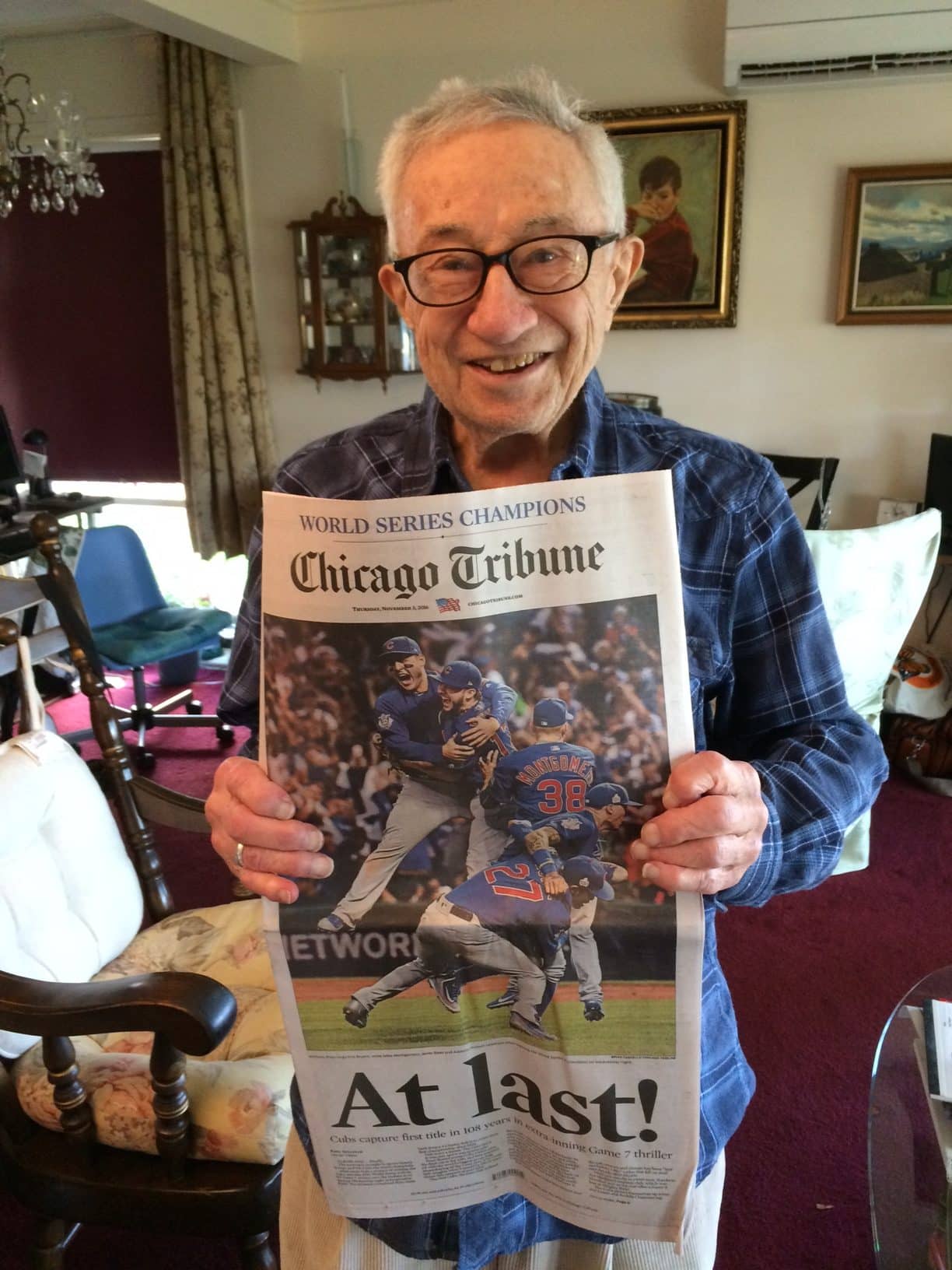 The author’s father holding up a copy of The Chicago Tribune reporting the Cubs World Series win Nov. 2, 2016.
The author’s father holding up a copy of The Chicago Tribune reporting the Cubs World Series win Nov. 2, 2016. My Dad died in suburban Chicago on Shabbat April 18. Neither my brothers nor I could be there due to COVID-19 restrictions. We were able to get him into hospice and he died the way he wanted ‘ at home, in peace, without pain and with friends present who loved him. The rabbi recited the shema and sang other songs to him on a speaker hooked up to a cell phone.
There are a lot of things I’m sure my father might have wanted to do. He didn’t get to see Paris or Jerusalem, but he did get to see the Cubs and the White Sox win a World Series and if asked, he probably would have preferred the latter.
I read that we say a special prayer in memory of three righteous individuals who died on Shabbat: Joseph, Moses and King David – three very different titans in Jewish history. I got to thinking, what brings them together? Why did they die on Shabbat? What’s the common denominator, and what, if anything, do they have in common with my dad?
Joseph lived to be 110; Moses 120; and David, the proverbial, three score and ten – 70. King David set the modern standard for life at 70, a number oddly dictated by Moses in Psalm 90. So all of this, and numerology aside (and there is a lot to be said about the numbers 7, 10, and 14), what binds them together?
With famine everywhere, the 12 tribes went down to Egypt seeking to survive, and they wouldn’t have, had not Joseph become the overseer of the land and rationed its bounty so that society endured. Moses brought the people out of Egypt when it had become sufficiently poisonous to put them on the verge of extinction, and guided them to land in which they would prosper. King David subdued the last, greatest physical threat to the Jewish nation, greatly enlarged the land and conquered Jerusalem, ensuring Israel’s physical and spiritual wellbeing for generations. All were great men, yet all doubted their greatness at one point or another.
These three men created the superstructure within which the Hebrew and Jewish nation could thrive and grow. They deeply involved themselves in politics and the public good, working overtime, sacrificing longevity for service. How fitting that they came to their final rest on the day of rest.
My father died at the age of 100, and doubted his own greatness. In an age when a man’s worth is defined by his wealth, his possessions and his social stature, my father looked in that mirror and saw little. Though he served in the Army from 1942-46, he always questioned his contribution to winning the war (and his bravery) because he never shipped over and fought. Twice he was slated for embarkation. Once he broke his ankle jumping from ship to ship with his pack on his back, and the second time he caught pneumonia when they had GI’s bedded down in dank and slimy barges at the waterfront. But in the spirit of Joseph, Moses and King David, his greatness was to come.
In 1949 he moved to Skokie, Ill. when it was just prairie and (with my mom), despite a grueling work schedule, threw himself into its civic, social and political life. The First Jewish Congregation, Niles Township Jewish Congregation (now Ezra Habonim NTJC) was formed in my parents’ living room with five other couples. My father was a president of the Men’s Club. He and my mom took turns being president of every PTA for every school my brothers and I attended. He was a scoutmaster for my Troop, 215. He was a founding member of the Skokie Caucus Party that ousted an old guard, president of the Lion’s Club, and served on the Skokie planning commission for 50 years – into his nineties – and a four-time president. They both marched for charities and long after their children were parents themselves, they volunteered as readers in the neighborhood Elementary school and helped create a foundation that led to its newly-finished, complete renovation.
After years on the road as a sales rep for first a local toy company and later, national publishers, my father went to work in the Chicago state’s attorney’s office as an assets investigator in the Child Support division, running down deadbeat dads and finding where they hid the money, long before there was such a thing as the internet.
The true “greatness” of the greatest generation is that they never lost sight of the greatest good – the mandate to build and keep a society in which they, and more importantly, their children and generations to come could thrive. This is one of the unique lessons of the Torah, which is foundationally a blueprint for a multi-generational sustaining society that thrives under an accepted matrix of religion, laws, mores and common heritage.
Skokie would not be Skokie without my dad. Its thriving synagogues and Jewish life are a testimony to his and my mom’s dedication. So during Shabbat afternoon prayers, when we say tzidkatchka in the spirit of Joseph, Moses and King David, I’m going to add his name – Mort Paradise. I think he earned it.
Mitch Paradise is a writer, producer and teacher in Los Angeles.






















 More news and opinions than at a Shabbat dinner, right in your inbox.
More news and opinions than at a Shabbat dinner, right in your inbox.